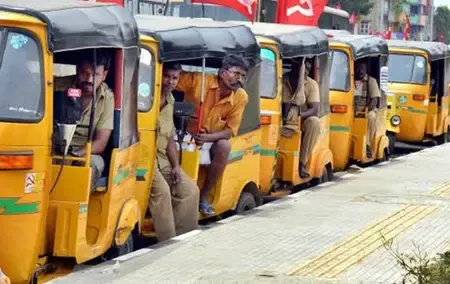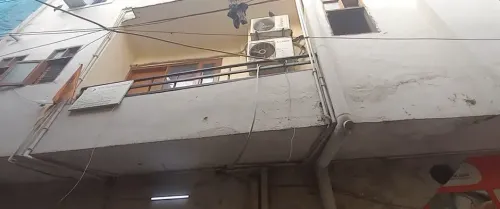Why Are Auto Unions in Ahmedabad Protesting?

Synopsis
Key Takeaways
- The auto unions in Ahmedabad have initiated an indefinite strike.
- Allegations against police include harassment and wrongful penalties.
- Traffic disruptions are affecting daily commuters significantly.
- The number of auto-rickshaws in Ahmedabad has grown substantially over the years.
- The strike could escalate if demands are not addressed promptly.
Ahmedabad, July 22 (NationPress) A confrontation between auto-rickshaw drivers and the Ahmedabad Police has escalated into a widespread strike, as rickshaw unions initiated an indefinite protest. Claiming that the police have engaged in unwarranted harassment and unjust penalties, the auto unions have removed their vehicles from the streets since midnight on Monday, resulting in significant disruption for daily commuters citywide.
The strike has caused traffic bottlenecks at numerous critical intersections, leaving frustrated travelers stranded due to the lack of last-mile transport alternatives.
Witnesses noted that some protesting drivers were forcibly halting rickshaws with passengers, encouraging fellow drivers to join the strike.
According to auto union leaders, the protest was sparked by a series of alleged arbitrary actions taken by police officers, including the wrongful confiscation of vehicles and fines imposed under the guise of enforcing the Motor Vehicles Act.
They presented an official memorandum to the Police Commissioner, asserting that this enforcement is being misused to achieve “targets” rather than to promote road safety.
“The state government recognizes auto-rickshaws as a legitimate source of income, yet our members are being unjustly targeted and harassed,” they declared.
Furthermore, they alleged that in addition to traffic police, general law enforcement agents are intervening in traffic management, which they argue is beyond their authority.
The auto union leaders also accused certain police officials of accepting bribes from other commercial vehicle operators like tractors, dumpers, and luxury cabs, while unfairly penalizing auto drivers.
Rickshaw drivers have cautioned that if police actions are not promptly addressed, the protest may escalate, potentially halting public transport throughout Ahmedabad.
The city administration has yet to offer an official response as commuters continue to endure disruptions amid escalating tensions.
As of 2021, Ahmedabad is home to approximately 170,000 auto-rickshaws, a significant increase from around 40,000 in 2011, reflecting a growth of more than fourfold over ten years. These vehicles constitute roughly 4 percent of all registered vehicles in the city, which totaled nearly 4 million by 2022.
Auto-rickshaws play a crucial role in last-mile connectivity, especially in regions lacking access to the Bus Rapid Transit System and metro services.
A policy set to take effect on January 1, 2025, mandates the use of operational fare meters in all autos.
Despite this regulation, over 28,000 drivers have been fined, resulting in Rs 1.56 crore in penalties collected by traffic police.
In the meantime, a driving safety initiative is introducing QR codes on autos to enhance transparency and passenger safety.
These codes provide driver information and are part of the Nirbhaya safety initiative, although this measure has faced opposition from driver unions due to privacy concerns.









